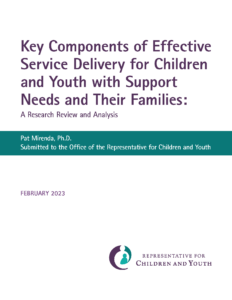Access to services for children and youth with support needs in our province is at the top of mind for many families and community organizations alike. We hear from families reaching out for support through our Advocacy Line expressing how exhausted and in need of support they are. We hear from our organizational members struggling to support children and youth with the allocations they have, knowing many are being left out of services or not receiving enough. The changes are long overdue, and a constant question remains: what should change look like?
As communities and organizations embark on various engagement options to inform this transformation, we are encouraged at how the community-based research and work from our Kids Can’t Wait campaign is aligned with the findings of the new research review and analysis released by the Representative for Children and Youth earlier this year.
 The report Key Components of Effective Service Delivery for Children and Youth with Support Needs and Their Families is a commissioned literature review that revealed six key components for effective service delivery:
The report Key Components of Effective Service Delivery for Children and Youth with Support Needs and Their Families is a commissioned literature review that revealed six key components for effective service delivery:
- Provision of family-centred care; cross-sector collaboration and connection to community networks and resources;
- Coordination of services across therapies;
- Sufficient, accountable funding, equitable funding allocation, and sufficient resources;
- Services customized to meet individual needs (intensity, quality); and
- Staff training related to the service delivery model.
These key components clearly include the four pillars or key themes that emerged from the 2019 Kids Can’t Wait gathering that became the foundation of our Multi-Year Action Plan:
- Data collection and resources driven by community-based research to inform solutions.
- Intersectoral collaborations to collectively address the needs of children, youth, and their families.
- Family-centred practice to build family capacity and support community inclusion.
- Equitable access to well-funded service and resources to meet their needs.
The Kids Can’t Wait pillars have guided our systemic advocacy for better services for children and youth with disabilities – including, and particularly, during the last two years of constant changes announced by the Ministry of Children and Family Development.
We are a non-profit organization advocating for the rights and opportunities of people with intellectual and developmental disabilities and their families. Our Kids Can’t Wait campaign has had the goal of ensuring that BC’s early intervention and early education systems are well-funded, readily accessible, personalized and anchored in policy and practice. We have been working with people and organizations from across the province to advocate for a stronger system of services and support for children with disabilities and their families.
This alignment between community-based and literature review research supports what the transformation of services and support for children and youth needs to be to better serve our young population. Now we need the next framework to show how the six key components and the four pillars will become real to support children and youth to thrive. Our committed advocacy towards this continues.
Additionally, the latest Standing Committee on Children and Youth report on Reforming the Representative of Children and Youth Act includes most of our recommendations. We are optimistic at the possibility that the Representative’s mandate will be expanded to better advocate on an individual and systemic level for the rights of children, youth, and young adults with disabilities and to keep systems accountable.
This article was featured in the latest edition of our monthly newsletter, Inclusion in Action. Subscribe today to receive regular updates like this.


